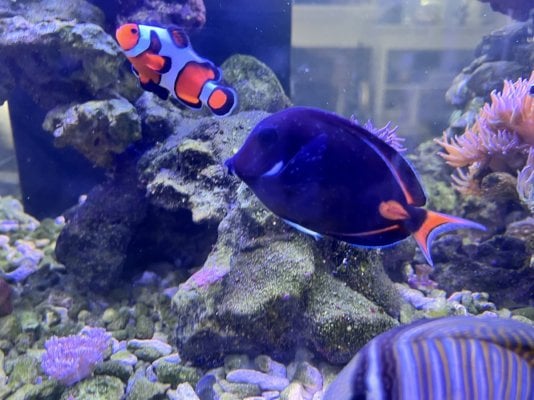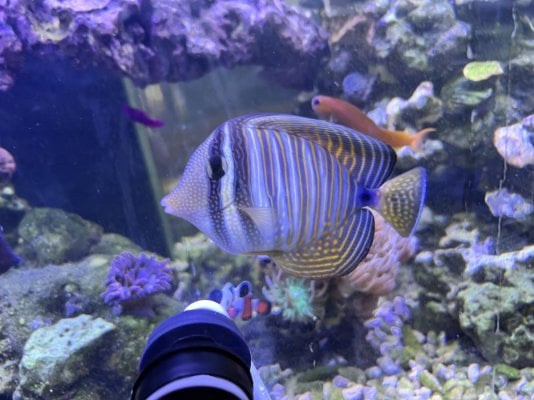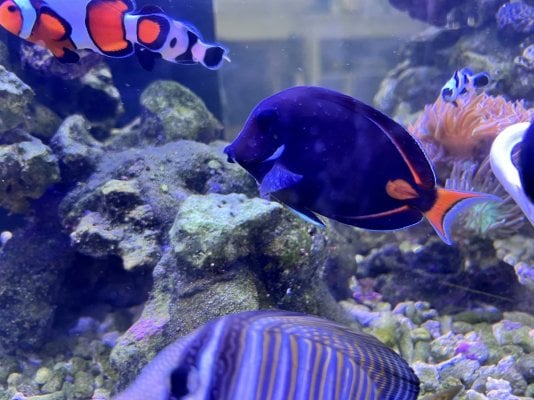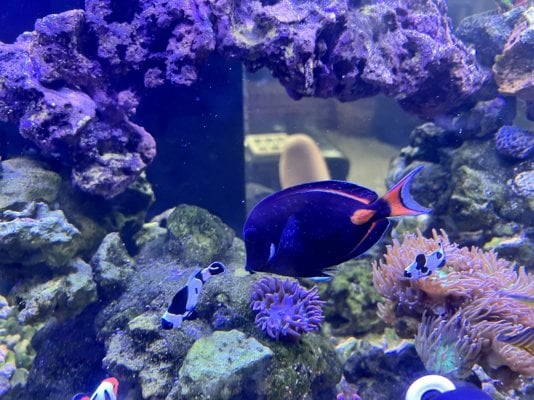Navigation
Install the app
How to install the app on iOS
Follow along with the video below to see how to install our site as a web app on your home screen.
Note: This feature may not be available in some browsers.
More options
You are using an out of date browser. It may not display this or other websites correctly.
You should upgrade or use an alternative browser.
You should upgrade or use an alternative browser.
Achilles Tang help
- Thread starter richardlfernandes
- Start date
- Tagged users None
How long has the Achilles been in the tank?
Likewise for the other fish--how long?
Did you follow any QT procedures before adding any of the fish to the tank?
Have you experienced parasites (ich, velvet, flukes) previously? If so, how did you treat?
Likewise for the other fish--how long?
Did you follow any QT procedures before adding any of the fish to the tank?
Have you experienced parasites (ich, velvet, flukes) previously? If so, how did you treat?
If the fish is well established and healthy I would just spoil him with good nutrition and let it pass. You could also research H202 as well. I've never put a fish in a chemical so I can't help with the poisons.
vetteguy53081
Well known Member and monster tank lover
View Badges
Partner Member 2024
Excellence Award
Reef Tank 365
RGB
Article Contributor
Tampa Bay Reef Keepers
West Palm Beach Reefer
Hospitality Award
Ocala Reef Club Member
305 Reef Club
Wisco Reefers
Midwest Reefer
Fish Medic
MAC of SW Florida
Rock Pool Reef Keepers
R2R Secret Santa 2023
My Tank Thread
My Aquarium Showcase
Nutrition wont stop this as its ich which they are susceptible to. Fish will need treatment in a separate tank using coppersafe at 2.25-2.5 for a full 30 days. These spots are bound to multiply without treatment. The big concern is other tankmates which may not show spots but have been exposed and too will need treatment.
Monitor levels with hanna copper test kit and add aeration during treatment
If the fish was well established and healthy, assuming your statement is accurate, why would it have gotten infected by ich in the first place, and why has the infection apparently worsened since the number of spots is higher than normally seen when a fish is first infected?If the fish is well established and healthy I would just spoil him with good nutrition and let it pass. You could also research H202 as well. I've never put a fish in a chemical so I can't help with the poisons.
While some advocate allowing a fish a chance to recover (or Not) without medication, the high cost of fish such as these certainly justifies the use of proven medical treatments such as the copper treatment advocated.
- Joined
- May 3, 2020
- Messages
- 200
- Reaction score
- 200
Like others have said, be sure he is fed well and low stress and he should be able to pass it. My achilles will show spots once in awhile but he is a spoiled fat cow so he gets passed them
Some fish Achilles and powders especially are a lot more susceptible. I had an Achilles years ago that only got infected after three years in my possession. What triggered it was the addition of a large naso. The spots will get worse before they get better its kinda like chicken pox in humans. I've always preferred to keep excellent water conditions and feed heavy to keep all the animals at peace while it runs its coarse. I know other experienced keepers who wouldn't bat an eye at it let alone tear their tank apart as well as some who welcome it. Putting a fish in copper especially an Achilles is just prolonging the inevitable.If the fish was well established and healthy, assuming your statement is accurate, why would it have gotten infected by ich in the first place, and why has the infection apparently worsened since the number of spots is higher than normally seen when a fish is first infected?
While some advocate allowing a fish a chance to recover (or Not) without medication, the high cost of fish such as these certainly justifies the use of proven medical treatments such as the copper treatment advocated.
Seems early. It’s their but few.
I’d just keep a close eye on that, see if spots increase or it loses appetite, gets lathargic or any combination.
If spots continue to escalate, or show on others, then be prepared to take action.
Twice, be it luck, my 5 year old tang got ick, spots increased twice, then started to decrease over three weeks. Twice in about 2 years! Took no action.
I’d just keep a close eye on that, see if spots increase or it loses appetite, gets lathargic or any combination.
If spots continue to escalate, or show on others, then be prepared to take action.
Twice, be it luck, my 5 year old tang got ick, spots increased twice, then started to decrease over three weeks. Twice in about 2 years! Took no action.
This is true in some cases. It is not true in all cases. A tank with a high fish bioload may not just 'recover' with nutrition. I certainly wouldn't gamble with a several hundred/thousand dollar investment. Heavy nutrition can also cause stress - by increasing ammonia, nitrate, etc. if it's not entirely eaten.Heavy nutrition = less stress.
Take someone else's words outta context.
The parasite will pass in a healthy specimen kept in proper conditions without chemicals.
Visually, given the way the fish looks and the species involved, this is marine ich, Cryptocaryon irritans. For many years, I stopped acquiring powder blues and achilles because they simply always seemed to develop ich. then, if their infection got worse enough, the disease would "break" and transmit to the other fish in the tank. In the past decade or so, I've gone back to acquiring these, but have ALWAYS run them through a comprehensive copper quarantine, using amine-chelated copper for 30 days. That has pretty much eliminated the problem for me.
If you read the whole thread you would of seen me stress the importance of water quality. With that being said I believe your whole statement is null and void. I will admit your play on words was a nice try but something can't "recover" from a parasite until the parasite no longer exists. Come on bud your a fish medic you should know that.This is true in some cases. It is not true in all cases. A tank with a high fish bioload may not just 'recover' with nutrition. I certainly wouldn't gamble with a several hundred/thousand dollar investment. Heavy nutrition can also cause stress - by increasing ammonia, nitrate, etc. if it's not entirely eaten.
I read the whole thread. Your comments border on the ridiculous. If you think I'm planning what I say as a gotcha, etc - or something - you are barking up the wrong tree. The totality of the issue is that I totally disagree with your opinions.If you read the whole thread you would of seen me stress the importance of water quality. With that being said I believe your whole statement is null and void. I will admit your play on words was a nice try but something can't "recover" from a parasite until the parasite no longer exists. Come on bud your a fish medic you should know that.
BTW - this is also a false statement. Many fish develop immunity to parasites - i.e they recover. If you don't know that - not my problem. Fish can recover from a parasite - though the parasite still exists in the tank - its basic microbiology.If you read the whole thread you would of seen me stress the importance of water quality. With that being said I believe your whole statement is null and void. I will admit your play on words was a nice try but something can't "recover" from a parasite until the parasite no longer exists. Come on bud your a fish medic you should know that.
This has not been recommended (tearing the tank apart) - your comments about delaying the inevitable - is not backed up by any science or anything but your opinion (like mine). I'm not sure who decided you were the arbiter of ich in a marine tank.I know other experienced keepers who wouldn't bat an eye at it let alone tear their tank apart as well as some who welcome it. Putting a fish in copper especially an Achilles is just prolonging the inevitable.
- Joined
- Nov 2, 2019
- Messages
- 519
- Reaction score
- 528
I got a healthy young adult Achilles Tang from a friend who had it for several months. I know my tank has ich but going fallow is not an option and all other fish were fine ( immunity and good nutrition). His ich issues started slowly and I fed him a ton of nori and mysis. This helped but after 3 months he succumbed and died. Did some research and read that Achilles have a very rough time with ich so best of luck. Btw: replaces him with a Gem tang and he is totally ok - after 6 months no ich
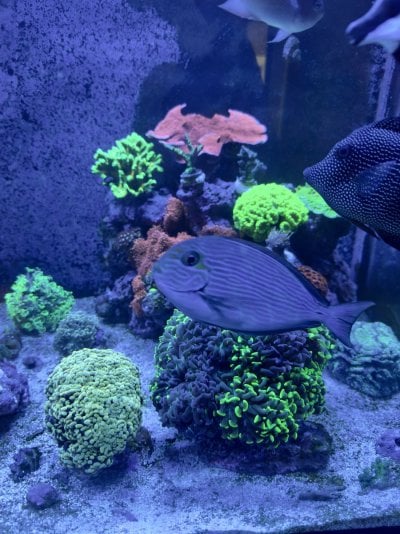

Some fish Achilles and powders especially are a lot more susceptible. I had an Achilles years ago that only got infected after three years in my possession. What triggered it was the addition of a large naso. The spots will get worse before they get better its kinda like chicken pox in humans. I've always preferred to keep excellent water conditions and feed heavy to keep all the animals at peace while it runs its coarse. I know other experienced keepers who wouldn't bat an eye at it let alone tear their tank apart as well as some who welcome it. Putting a fish in copper especially an Achilles is just prolonging the inevitable.
The chance of “ich management” working or not is controlled by the number of trophonts seen on the fish at the time the process is begun. Once the trophonts reach a certain level, their presence itself becomes a stressor and overruns the fish’s innate or acquired immunity, and the fish succumbs to the disease.
The number of trophonts on a fish at which this happens varies, but I use 30 visible trophonts as being the tipping point. This fish is right there. I think passive ich management (water quality and feeding alone) will fail. My guess is that even active ich management will fail in this case, but here are the instructions for that:
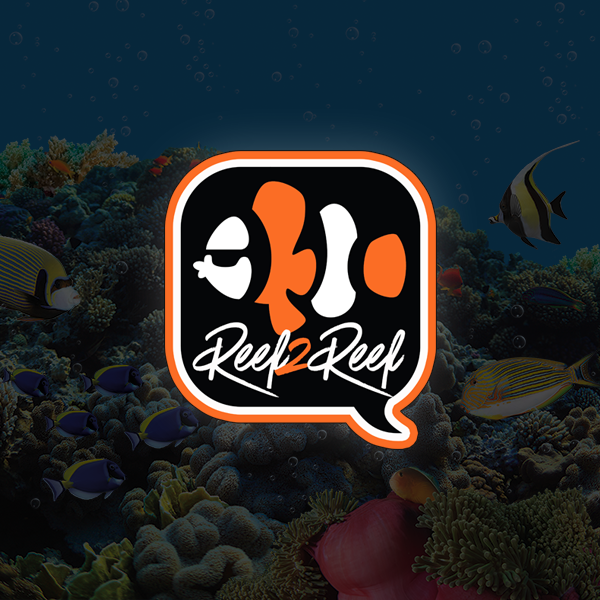
"Ich Management"
Because this topic continues to come up, I wanted to create a sticky thread so that it is more easily referenced. Please understand that I am NOT presenting this as an optimum method for controlling marine ich, just putting it out there for people who want to try it. Also, do not pick and...
 www.reef2reef.com
www.reef2reef.com
By the way just to make 2 points, 1. Re-reading my posts I may have made it sound like I was disagreeing with you personally as compared to just voicing my opinion for which I apologize. 2. There are many ways to skin a cat - and you're right good nutrition and low stress are ways to partially mitigate the risk of Ich. However, my confusion with the rationale for the ich management method is that many of the other diseases are much more difficult (except in unique situations) - so even though you may be managing 'ich', having ich in a tank being silently passed around fish may lead to more stress, and likelyhood for other disease thats not as easy to manage. Perhaps I'm wrong.If you read the whole thread you would of seen me stress the importance of water quality. With that being said I believe your whole statement is null and void. I will admit your play on words was a nice try but something can't "recover" from a parasite until the parasite no longer exists. Come on bud your a fish medic you should know that.
No one uses TTM or chloroquine phosphate anymore? To the OP, it’s ich. Your established tank mates have had it but may not show symptoms. Treating the Achilles will do little for him if you plan on reintroducing him to your DT, since he will be reinfected. Only way to rid your DT of ich is to remove and treat all fish and leave it fish less for 72-76 days. Depending on tank temp. Some say higher temps of 82+ it’s 45 days. I have only ever done 76 days at 77 degrees. If it’s a FOWLR, you could dose CP providing you don’t have wrasse, hippo tangs too. There is a chart somewhere on here
Last edited:
I believe this has already been mentioned. But - when one considers the risk of flukes, velvet, etc - not sure TTM is very helpful - but if it's Ich - it should be.No one uses TTM or chloroquine phosphate anymore? To the OP, it’s ich. Your established tank mates have had it but may not show symptoms. Treating the Achilles will do little for him if you plan on reintroducing him to your DT, since he will be reinfected. Only way to rid your DT of ich is to remove and treat all fish and leave it fish less for 72-76 days. Depending on tank temp. Some say higher temps of 82+ it’s 45 days. I have only ever done 76 days at 77 degrees. If it’s a FOWLR, you could dose CP providing you don’t have wrasse, hippo tangs too. There is a chart somewhere on here
Similar threads
- Replies
- 11
- Views
- 254
- Replies
- 14
- Views
- 544
- Replies
- 3
- Views
- 120
- Replies
- 2
- Views
- 111
- Replies
- 3
- Views
- 160



